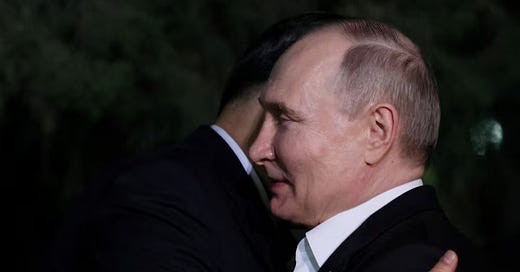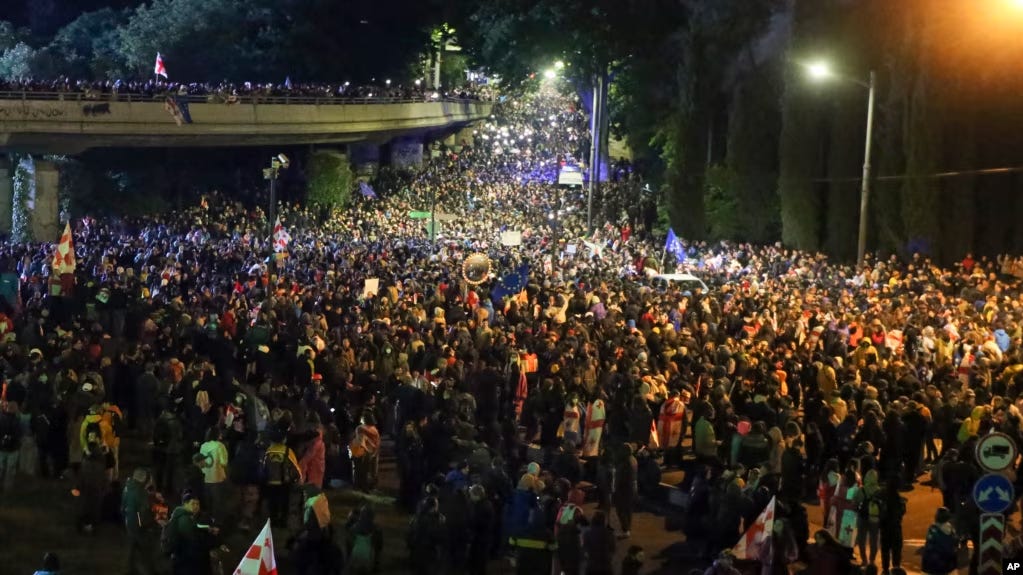Apologies for not sending one of these last week. The week simply got away from me. So much has happened in the last two weeks, however, that the best format is to simply to a quick run through of the events that have stood out to me. So, here we go.
Situation in Ukraine and Russia
#1-Russia had its Victory Day celebrations on May 9th. There is no “victory” to celebrate in Ukraine, so Putin is attempting to use the memory of victory over Nazi Germany to find support for his war. His political use of this legacy is not new; however, it has been much more overt and comprehensive since the full-scale invasion of Ukraine. The “celebrations” were still somewhat subdued and not as large as in years past. Fewer foreign dignitaries and less military equipment. Only one tank was involved.
#2-The attacks on Ukrainian energy infrastructure have continued, as have Ukrainian attacks on Russia’s energy production facilities. The reciprocal attacks have affected each country. Ukraine is concerned that they will not have enough energy to continue production levels needed, not to mention basic energy needs for civilians. Russia’s ability to refine oil and natural gas has been reduced, hurting its economy somewhat. In addition, some of the strikes by Ukraine have been fairly deep within Russian territory, demonstrating to Russia that they are increasingly vulnerable as the result of their war. Ukraine has also increasingly attacked military targets inside Crimea, which is equally worrying to Russia.
#3-The Slovakian PM, Robert Fico, has appeared to survive an assassination attempt. He was shot by a 71-year-old man on Wednesday. He is a controversial figure and relevant to us, has opposed assistance for Ukraine. In his election campaign last fall, he called for an end in assistance to Ukraine and an end to sanctions against Russia. The motivation behind the assassination is unclear, although it seems it was more anti-government than anything else. Russia has already tried to paint this as anti-Russian and will no doubt ramp up its propaganda effort in this respect, using this event to argue support for Ukraine is dangerous and violent. They could perhaps find a willing stooge in Hungarian PM Orban, who is close to Fico and sympathetic to Russia. Something to look out for.
#4-The foreign-agent law in Georgia, which has been discussed in previous posts, was passed on Wednesday. The bill will go to Georgia’s president next, who has promised to veto it. However, the ruling party (Georgian Dream) has enough votes to override the veto. So, it appears it will become a law. The protests have not abated and once it officially becomes a law there will likely be another increase in number and intensity of protests. While nothing is likely to happen in the near future, it is certainly worth keeping an eye on and the next round of parliamentary elections in Georgia will be very dicey for the ruling party.
#5-This is not a new event, but I have been reading Christopher Miller’s book, The War Came to Us. It is generally interesting and offers a first-hand account of the initial full-scale invasion, as well as some context of the 2014 invasion. But one part stood out to me especially, as a person still trying to piece together what led to Russia’s full-scale invasion. Miller mentions that after Zelensky’s government took steps to reduce the influence of Viktor Medvedchuk Putin believed he could no longer work with Zelensky. Medvedchuk was a pro-Putin member of the Ukrainian parliament and controlled media outlets that would advance the pro-Russian narrative of events. Why I find this interesting is that it lays out a plausible narrative for why Putin decided to launch the full-scale invasion. Zelensky was elected partially with a promise to negotiate with Russia and resolve the frozen conflict leftover from 2014. The previous president, Poroshenko, was someone Putin did not think he could work with, but Putin believed that Zelensky would be more malleable and more pro-Russian. So, Putin believed he could achieve his aims without resorting to the use of force. When it became clear that he could not (the final straw being Zelensky’s crackdown on Medvedchuk) he moved on to the full-scale invasion. It was not long after all of this that Russia deployed 3000 paratroopers to the border, which was the first step in the pre-invasion buildup.
I also like this narrative because it is focused on the two parties involved, Russia and Ukraine. Much of the discussion in the U.S. falls into partisan bickering, with Republicans blaming Democrats or vice versa. American political discussion about international events tends to overestimate the influence and importance of the U.S. and minimize the domestic politics of the countries involved. However, events are almost always more about domestic politics than the actions of the U.S.
Russian President Vladimir Putin and Chinese President Xi Jinping bid farewell at the end of talks in Beijing, China May 16, 2024. Sputnik/Mikhail Metzel/Pool via REUTERS/File Photo
#6-Putin visited China this week and met with Chinese leader Xi Jinping. This is on the back of Xi’s visit to Europe last week, where he met with French President Macron, Hungarian PM Viktor Orban and Serbian President Aleksandr Vucic. The visit to Europe had some hoping that Xi could be convinced to reduce China’s support for China. This is something that both the U.S. and Europe has been pressing China to do. However, his meeting with Orban and Vucic, two European leaders who are more sympathetic to Russia than Europe in general, and then his warm embrace (literally) of Putin on his visit to China has dashed these hopes. It appears that China will not only to continue to support Russia but probably increase their support. This is bad news. Maybe next week I will write more about this, but Russia absolutely needs China’s support, both economically and militarily, to win this war in Ukraine. The U.S. and Europe know this and were hoping that they could use their economic leverage to move China away from this support. That mission has apparently failed.
#7-Finally, Russia launched a new offensive in northeast Ukraine. It has made some gains, and there are some initial worrying signs that Russia is engaged in war crimes similar to those they committed in Bucha in 2022. Northeast Ukraine is home to the second largest city, Kharkiv, and an area that Russia controlled after the initial invasion in 2022 but Ukraine took back in their successful counter-offensive in the Fall of 2022. In addition to the strategic and humanitarian fallout of Russia taking control of this area again, there would be a symbolic fallout as well. It would be a sign of Russia building momentum and perhaps pushing to take as much territory as they can before the winter. If you want a more complete story of what is happening, this story from the Telegraph is very insightful.
Elections
The first round of the Lithuanian presidential election happened last week. The three main candidates were the incumbent Gitanas Nauseda, an economist, the current PM Ingrida Simonyte, and lawyer Ignas Vegele. Nauseda received the most votes, with over 44% and Simonyte finished second with 20%. Those two will face off in a second round on May 26. Vegele finished in third with 12% of the vote. Vegele is not openly anti-Ukraine but uses rhetoric calling for a quick end to the war and not escalating the conflict. He is also more open to relations with China and has been accused of skirting the sanctions on Russia.
Lithuania is firmly in the Ukraine camp, but the election is symbolic of many other elections around the world. Vegele represents a kind of populist backlash against the “elites” and within the context of the Ukraine-Russia conflict, the populists are often pro-Russian. The extent of support for Ukraine in Lithuania is evident by the fact that Vegele finished third and did not advance to the second round. However, he did receive 12%, which does indicate there is a minority within Lithuania that at the very least is dissatisfied with the “establishment” and an even smaller number that is more pro-Russian than broader Lithuanian society. While it is not as much of a concern in Lithuania, it is a concern in places such as Slovakia, Hungary, Serbia, and maybe the U.S.
We discussed the Croatian elections ages ago. The current PM and ruling party HDZ have formed a coalition in Croatia. The ruling party will join with right-wing Homeland Movement (DP), to form its coalition government. It is good, in the sense that HDZ is a strong supporter of Ukraine. But there will be tensions with their coalition partner, probably around agricultural policy, as seen in Poland and other places. This is something to keep an eye on in Europe more broadly. The populist parties/leaders focus a great deal on agricultural policy. This has been true for a long time with respect to regulations and laws from the EU and is part of the basis for some of the anti-EU sentiment in countries. But now, it can be funneled toward Ukraine and the EU policy of buying grain and other agricultural goods from Ukraine to help support its economy. Russia will be active in bringing these tensions to the forefront and promoting these populist sentiments in Croatia and other countries.







